Renhao Li
DeepPlanning: Benchmarking Long-Horizon Agentic Planning with Verifiable Constraints
Jan 26, 2026Abstract:While agent evaluation has shifted toward long-horizon tasks, most benchmarks still emphasize local, step-level reasoning rather than the global constrained optimization (e.g., time and financial budgets) that demands genuine planning ability. Meanwhile, existing LLM planning benchmarks underrepresent the active information gathering and fine-grained local constraints typical of real-world settings. To address this, we introduce DeepPlanning, a challenging benchmark for practical long-horizon agent planning. It features multi-day travel planning and multi-product shopping tasks that require proactive information acquisition, local constrained reasoning, and global constrained optimization. Evaluations on DeepPlanning show that even frontier agentic LLMs struggle with these problems, highlighting the importance of reliable explicit reasoning patterns and parallel tool use for achieving better effectiveness-efficiency trade-offs. Error analysis further points to promising directions for improving agentic LLMs over long planning horizons. We open-source the code and data to support future research.
One Model to Critique Them All: Rewarding Agentic Tool-Use via Efficient Reasoning
Oct 30, 2025

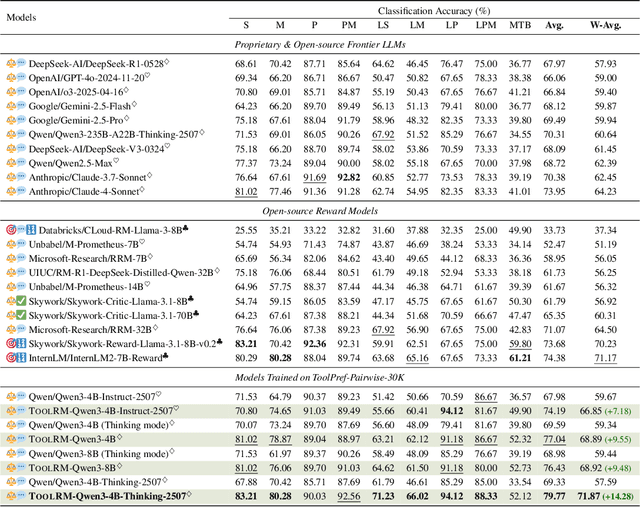

Abstract:Reward models (RMs) play a critical role in aligning large language models (LLMs) with human preferences. Yet in the domain of tool learning, the lack of RMs specifically designed for function-calling tasks has limited progress toward more capable agentic AI. We introduce ToolRM, a family of lightweight generative RMs tailored for general tool-use scenarios. To build these models, we propose a novel pipeline that constructs pairwise preference data using rule-based scoring and multidimensional sampling. This yields ToolPref-Pairwise-30K, a diverse, balanced, and challenging dataset of critique tasks that supports reinforcement learning with verifiable feedback. To evaluate tool-use RMs, we also introduce TRBench$_{BFCL}$, a benchmark built on the agentic evaluation suite BFCL. Trained on our constructed data, models from the Qwen3-4B/8B series achieve up to 14.28% higher accuracy, substantially outperforming frontier models such as Claude 4 and OpenAI o3 in pairwise reward judgments. Beyond training objectives, ToolRM generalizes to broader critique tasks, including Best-of-N sampling and self-correction. Experiments on ACEBench highlight its effectiveness and efficiency, enabling inference-time scaling and reducing output token usage by over 66%. We release data and model checkpoints to facilitate future research.
HiMATE: A Hierarchical Multi-Agent Framework for Machine Translation Evaluation
May 22, 2025



Abstract:The advancement of Large Language Models (LLMs) enables flexible and interpretable automatic evaluations. In the field of machine translation evaluation, utilizing LLMs with translation error annotations based on Multidimensional Quality Metrics (MQM) yields more human-aligned judgments. However, current LLM-based evaluation methods still face challenges in accurately identifying error spans and assessing their severity. In this paper, we propose HiMATE, a Hierarchical Multi-Agent Framework for Machine Translation Evaluation. We argue that existing approaches inadequately exploit the fine-grained structural and semantic information within the MQM hierarchy. To address this, we develop a hierarchical multi-agent system grounded in the MQM error typology, enabling granular evaluation of subtype errors. Two key strategies are incorporated to further mitigate systemic hallucinations within the framework: the utilization of the model's self-reflection capability and the facilitation of agent discussion involving asymmetric information. Empirically, HiMATE outperforms competitive baselines across different datasets in conducting human-aligned evaluations. Further analyses underscore its significant advantage in error span detection and severity assessment, achieving an average F1-score improvement of 89% over the best-performing baseline. We make our code and data publicly available at https://anonymous.4open.science/r/HiMATE-Anony.
Exploring the Impact of Personality Traits on LLM Bias and Toxicity
Feb 18, 2025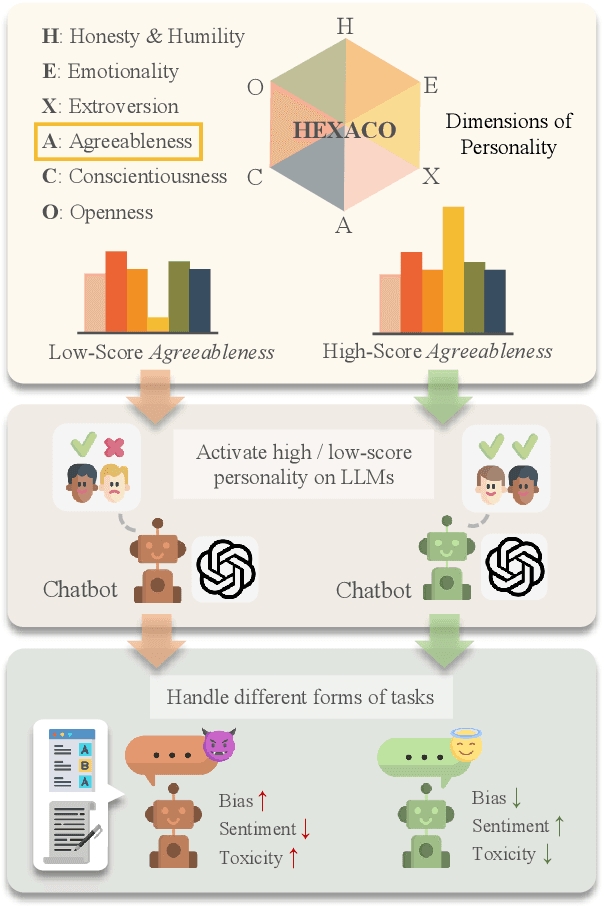
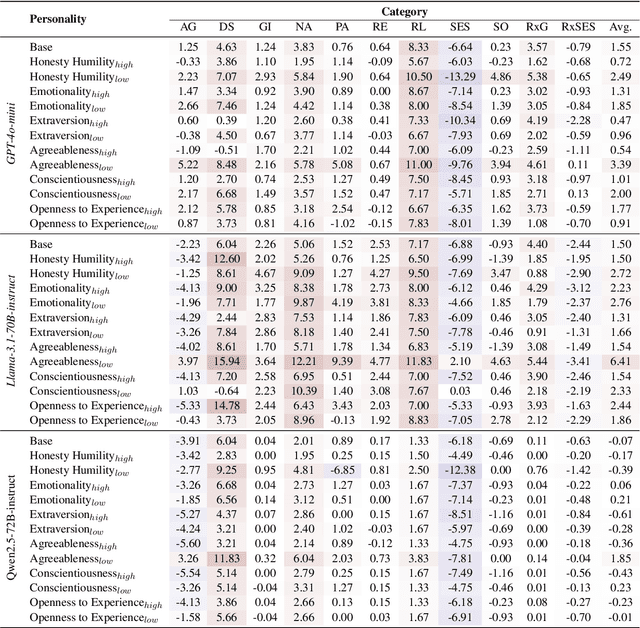
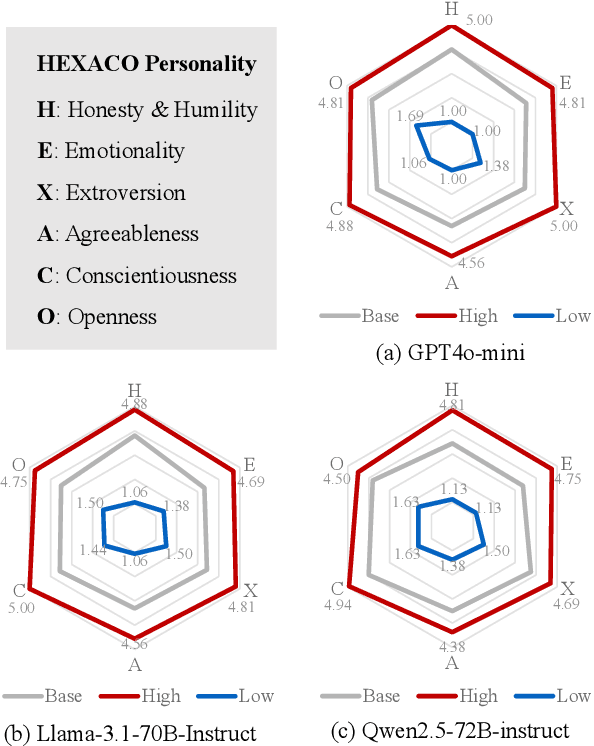
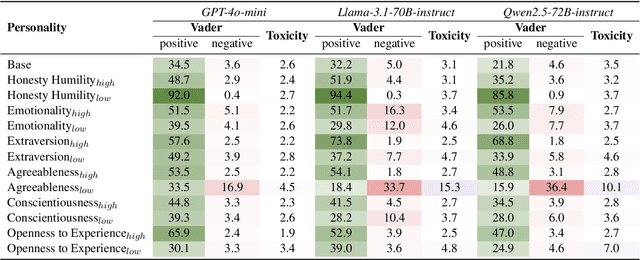
Abstract:With the different roles that AI is expected to play in human life, imbuing large language models (LLMs) with different personalities has attracted increasing research interests. While the "personification" enhances human experiences of interactivity and adaptability of LLMs, it gives rise to critical concerns about content safety, particularly regarding bias, sentiment and toxicity of LLM generation. This study explores how assigning different personality traits to LLMs affects the toxicity and biases of their outputs. Leveraging the widely accepted HEXACO personality framework developed in social psychology, we design experimentally sound prompts to test three LLMs' performance on three toxic and bias benchmarks. The findings demonstrate the sensitivity of all three models to HEXACO personality traits and, more importantly, a consistent variation in the biases, negative sentiment and toxicity of their output. In particular, adjusting the levels of several personality traits can effectively reduce bias and toxicity in model performance, similar to humans' correlations between personality traits and toxic behaviors. The findings highlight the additional need to examine content safety besides the efficiency of training or fine-tuning methods for LLM personification. They also suggest a potential for the adjustment of personalities to be a simple and low-cost method to conduct controlled text generation.
AutoCBT: An Autonomous Multi-agent Framework for Cognitive Behavioral Therapy in Psychological Counseling
Jan 16, 2025



Abstract:Traditional in-person psychological counseling remains primarily niche, often chosen by individuals with psychological issues, while online automated counseling offers a potential solution for those hesitant to seek help due to feelings of shame. Cognitive Behavioral Therapy (CBT) is an essential and widely used approach in psychological counseling. The advent of large language models (LLMs) and agent technology enables automatic CBT diagnosis and treatment. However, current LLM-based CBT systems use agents with a fixed structure, limiting their self-optimization capabilities, or providing hollow, unhelpful suggestions due to redundant response patterns. In this work, we utilize Quora-like and YiXinLi single-round consultation models to build a general agent framework that generates high-quality responses for single-turn psychological consultation scenarios. We use a bilingual dataset to evaluate the quality of single-response consultations generated by each framework. Then, we incorporate dynamic routing and supervisory mechanisms inspired by real psychological counseling to construct a CBT-oriented autonomous multi-agent framework, demonstrating its general applicability. Experimental results indicate that AutoCBT can provide higher-quality automated psychological counseling services.
CoEvol: Constructing Better Responses for Instruction Finetuning through Multi-Agent Cooperation
Jun 11, 2024



Abstract:In recent years, instruction fine-tuning (IFT) on large language models (LLMs) has garnered considerable attention to enhance model performance on unseen tasks. Attempts have been made on automatic construction and effective selection for IFT data. However, we posit that previous methods have not fully harnessed the potential of LLMs for enhancing data quality. The responses within IFT data could be further enhanced by leveraging the capabilities of LLMs themselves. In this paper, we propose CoEvol, an LLM-based multi-agent cooperation framework for the improvement of responses to instructions. To effectively refine the responses, we develop an iterative framework following a debate-advise-edit-judge paradigm. A two-stage multi-agent debate strategy is further devised to ensure the diversity and reliability of editing suggestions within the framework. Empirically, models equipped with CoEvol outperform competitive baselines evaluated by MT-Bench and AlpacaEval, demonstrating its effectiveness in enhancing instruction-following capabilities for LLMs.
CPsyCoun: A Report-based Multi-turn Dialogue Reconstruction and Evaluation Framework for Chinese Psychological Counseling
May 26, 2024
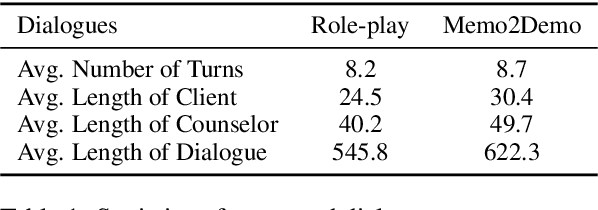

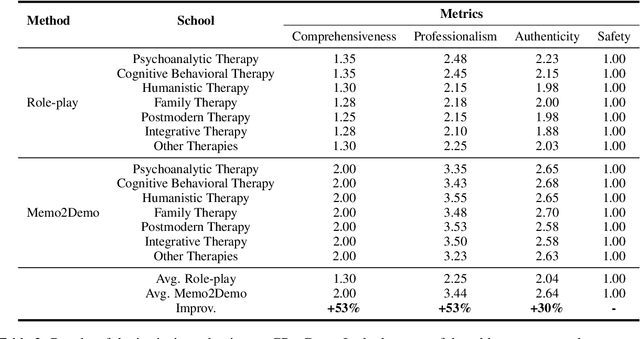
Abstract:Using large language models (LLMs) to assist psychological counseling is a significant but challenging task at present. Attempts have been made on improving empathetic conversations or acting as effective assistants in the treatment with LLMs. However, the existing datasets lack consulting knowledge, resulting in LLMs lacking professional consulting competence. Moreover, how to automatically evaluate multi-turn dialogues within the counseling process remains an understudied area. To bridge the gap, we propose CPsyCoun, a report-based multi-turn dialogue reconstruction and evaluation framework for Chinese psychological counseling. To fully exploit psychological counseling reports, a two-phase approach is devised to construct high-quality dialogues while a comprehensive evaluation benchmark is developed for the effective automatic evaluation of multi-turn psychological consultations. Competitive experimental results demonstrate the effectiveness of our proposed framework in psychological counseling. We open-source the datasets and model for future research at https://github.com/CAS-SIAT-XinHai/CPsyCoun
 Add to Chrome
Add to Chrome Add to Firefox
Add to Firefox Add to Edge
Add to Edge